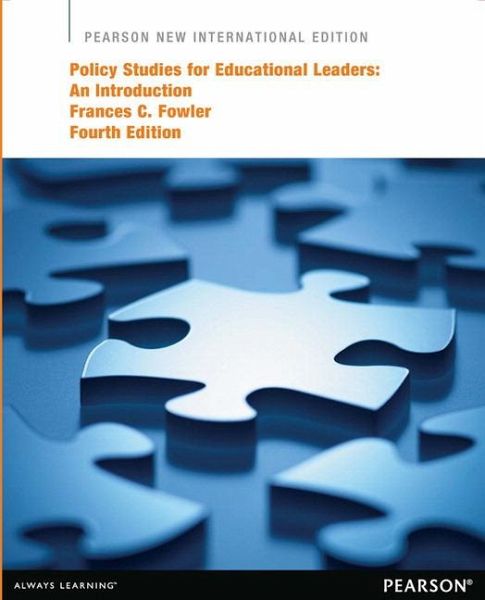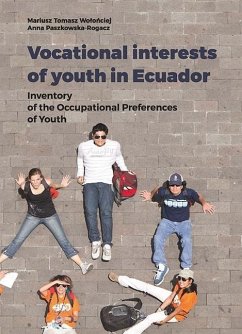
Policy Studies for Educational Leaders: An Introduction
Pearson New International Edition
Versandkostenfrei!
Versandfertig in 2-4 Wochen
98,99 €
inkl. MwSt.

PAYBACK Punkte
49 °P sammeln!
For courses in Educational Policy and Educational Leadership;
For potential and current K-12 administrators
From a leader in the field–a comprehensive text covering education policy and the policy process that encourages future educational leaders to be proactive–and gives them a firm understanding of educational policy and the important political theories upon which it is based.
While expressing the belief that it is important for today’s school leaders to know how to track educational policies and to seek to influence them, Frances Fowler, a well respected authority in the field of educational policy, recognizes that most leaders have little or no background in political science or policy studies and even less experience with the state politics of education. For these future and current administrators, Professor Fowler presents essential background information about the cultural, economic, demographic, and institutional roots of educational policy. She identifies and describes the major policy actors, and gives educators in depth descriptions of each stage of the policy process, complete with numerous examples of how policy unfolds in the development of educational policy. A goal of the book is to ensure that educational leaders understand the basic political theories that underpin educational policy development. To that end, the author provides example of how to apply this knowledge in everyday practice.
Features + Benefits
Students get a comprehensive look at all aspects of educational policy—theory, analysis, development, and implementation. They also see the reasons for change in educational policy, ways to track its evolution, and techniques for influencing its ultimatedestination.
The issues are all put into perspective for readers through an enlightening look at the history of educational policy.
The major concepts are reinforced for students through News Stories for Analysis and Case Studies sections that address current issues such as charter schools, bilingual education, high-stakes testing, and the implementation of the No Child Left Behind act.
Readers get understandable, up-to-date information presented through numerous current examples of educational policy issues and problems.
The concepts are made exceptionally clear through focus questions at the beginning of each chapter and instructional activities and suggestions for further reading at the ends of chapters.
Preface
PART ONE: THE BACKGROUND OF EDUCATION POLICY
Chapter 1: Policy–What It Is and Where It Comes From
Chapter 2: Power and Education Policy
Chapter 3: The Economy and Demographics
Chapter 4: The Political System and Political Culture
Chapter 5: Values and Ideology
PART TWO: POLICY ACTORS AND THE POLICY PROCESS
Chapter 6: The Major Education Policy Actors
Chapter 7: Setting the Stage and Getting on It: Issue Definition and Agenda Setting
Chapter 8: Getting the Words and the Money: Policy Formulation and Policy Adoption
Chapter 9: Looking at Policies: Policy Instruments and Cost Effectiveness
Chapter 10: Policy Implementation: Getting People to Carry Out a Policy
Chapter 11: Policy Evaluation: Determining If the Policy Works
Chapter 12: Education Policy in the United States: Retrospective and Prospective
Glossary
Appendix
Useful Web Sites for Following Education Policy
How to Locate Government Web Sites for Specific States
References
Name Index
Subject Index
For potential and current K-12 administrators
From a leader in the field–a comprehensive text covering education policy and the policy process that encourages future educational leaders to be proactive–and gives them a firm understanding of educational policy and the important political theories upon which it is based.
While expressing the belief that it is important for today’s school leaders to know how to track educational policies and to seek to influence them, Frances Fowler, a well respected authority in the field of educational policy, recognizes that most leaders have little or no background in political science or policy studies and even less experience with the state politics of education. For these future and current administrators, Professor Fowler presents essential background information about the cultural, economic, demographic, and institutional roots of educational policy. She identifies and describes the major policy actors, and gives educators in depth descriptions of each stage of the policy process, complete with numerous examples of how policy unfolds in the development of educational policy. A goal of the book is to ensure that educational leaders understand the basic political theories that underpin educational policy development. To that end, the author provides example of how to apply this knowledge in everyday practice.
Features + Benefits
Students get a comprehensive look at all aspects of educational policy—theory, analysis, development, and implementation. They also see the reasons for change in educational policy, ways to track its evolution, and techniques for influencing its ultimatedestination.
The issues are all put into perspective for readers through an enlightening look at the history of educational policy.
The major concepts are reinforced for students through News Stories for Analysis and Case Studies sections that address current issues such as charter schools, bilingual education, high-stakes testing, and the implementation of the No Child Left Behind act.
Readers get understandable, up-to-date information presented through numerous current examples of educational policy issues and problems.
The concepts are made exceptionally clear through focus questions at the beginning of each chapter and instructional activities and suggestions for further reading at the ends of chapters.
Preface
PART ONE: THE BACKGROUND OF EDUCATION POLICY
Chapter 1: Policy–What It Is and Where It Comes From
Chapter 2: Power and Education Policy
Chapter 3: The Economy and Demographics
Chapter 4: The Political System and Political Culture
Chapter 5: Values and Ideology
PART TWO: POLICY ACTORS AND THE POLICY PROCESS
Chapter 6: The Major Education Policy Actors
Chapter 7: Setting the Stage and Getting on It: Issue Definition and Agenda Setting
Chapter 8: Getting the Words and the Money: Policy Formulation and Policy Adoption
Chapter 9: Looking at Policies: Policy Instruments and Cost Effectiveness
Chapter 10: Policy Implementation: Getting People to Carry Out a Policy
Chapter 11: Policy Evaluation: Determining If the Policy Works
Chapter 12: Education Policy in the United States: Retrospective and Prospective
Glossary
Appendix
Useful Web Sites for Following Education Policy
How to Locate Government Web Sites for Specific States
References
Name Index
Subject Index
Dieser Artikel kann nur an eine deutsche Lieferadresse ausgeliefert werden.












